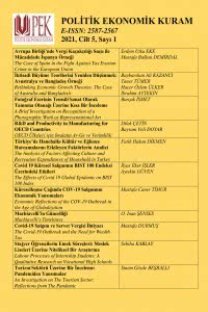Ticaret Savaşları mı, Küresel Kapitalizmin Regülasyon Açmazı mı? Uluslararası Ticaret Anlaşmaları Kimin için?
Bretton Woods sisteminin miadını doldurmasıyla, uluslararası ticaret büyük ölçüde 1994 yılında kurulan Dünya Ticaret Örgütü’nün kuralları çerçevesinde düzenlenmiştir. Örgütün kuruluşundan bugüne, örgütün işleyiş mekanizması ve bizatihi kendisi, üye devlet protestolarından, büyük çaplı kitlesel gösterilere, çeşitli tartışmaların merkezinde yer almıştır. “Küreselleşme” tartışmaları dönemi diye tariflenebilecek dönemin belki de ilk görünür geri çekilişi DTÖ’nün tıkanmasıdır. DTÖ’deki tıkanışın ardından gündeme gelen mega- bölgesel ticaret anlaşmaları, özellikle Obama yönetiminin TPP, TTIP ve TISA girişimi bu tıkanmaya bir cevap niteliğindedir. TPP Trump yönetimi tarafından askıya alınmış, ABD olmaksızın müzakereci 11 ülke CPTPP’yi imzalamış, TTIP ve TISA ise müzakereci ülkeler tarafından rafa kaldırılmıştır. TPP, TTIP ve TISA süreci askıya alınmış olsa da “ticaret savaşları” halen uluslararası medyanın en popüler meselelerinden biridir. Literatürde, ticaret anlaşmalarının değerlendirilmesinde yaşanan en büyük zorluk, sosyal bilim disiplinlerinin metodolojik yalıtılmışlığıdır. Anaakım uluslararası hukuk, uluslararası iktisat ve uluslararası ilişkiler, anlaşmaların farklı yönlerine odaklanmaktadır ancak anlaşmaları küresel kapitalizmin regülasyonu çerçevesinde değerlendirmek, uluslararası ticari ilişkileri salt ulus devletlerarasındaki rekabet, uluslararası örgüt merkezli kurumsal analiz veya düzenleyici hukuki metinler çerçevelerinin sınırlılığını aşmayı mümkün kılmaktadır. Makalede, TPP, TTIP, TISA gibi mega-bölgesel ticaret anlaşmalarının, uluslararası ticaretin regülasyon sorununu çözmeye dönük açılımlar olduğu, bu açılımların içeriğinin de ticaret savaşlarının merkezinde yer alan düzenleme esasları olduğu belirtilmektedir. Diğer bir değişle, TPP, TTIP ve TISA’nın merkezindeki tartışmanın ticaret savaşlarının özünü oluşturduğu savunulmakta, bu doğrultuda, anlaşmaların içeriğinin ötesine geçen bir okumayla uluslararası ticarette bir regülasyon açmazı olduğu tespiti yapılmaktadır.
Anahtar Kelimeler:
ticaret savaşları, mega bölgesel ticaret anlaşmaları, uluslararası regülasyon, TPP, TTIP, trade wars, megaregional trade agreements, international regulation
Trade Wars or the Dilemma of Regulation of Global Capitalism? International Trade Agreements for Whom?
After the Bretton Woods system headed for the last round-up, international trade was largely regulated within the framework of the rules of the World Trade Organization, which was established in 1994. Since the establishment of the organization, the functioning of the organization and itself has been at the center of various discussions, from member state protests to large-scale mass demonstrations. Perhaps the first visible retreat of the period that can be described as the period of “globalization” discussions is the deadlock in the WTO rounds. The mega-regional trade agreements that came to the fore after the WTO stalemate, especially the Obama administration's TPP, TTIP and TISA initiative has been emerged as a response to the deadlock in the process. TPP has been suspended by the Trump administration and then CPTTP was signed by other 11 countries of the TPP and negotiations of TTIP and TISA were suspended by partner states. Even though, the initiative was stalled, “trade wars” are still one of the most popular issues in the international media. The biggest challenge in analyzing trade agreements is the methodological isolation of social science disciplines in the literature. Mainstream international law, international economics, and international relations focus on different aspects of agreements but evaluating agreements within the framework of the regulation of global capitalism makes it possible to overcome the limitations of international trade relations only within the framework of competition between nation states, international organization-based institutional analysis, or regulatory legal texts. In the article, it is stated that mega-regional trade agreements such as TPP, TTIP and TISA are initiatives to solve the regulation problem of international trade, and the content of these initiatives is the regulation principles that are at the center of trade wars. In other words, it is argued that the debate at the center of TPP, TTIP and TISA constitutes the essence of trade wars, and in this direction, it is defended that there is a regulation dilemma in international trade with a reading that goes beyond the content of the agreements.
Keywords:
trade wars, megaregional trade agreements, international regulation, TPP, TTIP,
___
- European Commission (2016). TTIP: What consumers have to gain http://trade.ec.europa.eu/doclib/docs/2016/january/tradoc_154173.pdf
- Fetzer, T.& Schwarz, C. (2021). Tariffs and politics: evidence from Trump’s trade wars. The Economic Journal, 131, 1717–1741. https://doi.org/10.1093/ej/ueaa122
- Gallagher, K. (2008). Understanding Developing Country Resistance to the Doha Round. Review of International Political Economy, 15(1), 62–85.
- Gleeson, D., Lexchin, J., Lopert, R., & Kilic, B. (2018). The Transpacific Partnership Agreement, intellectual property, and medicines: Differential Outcomes for Developed and Developing Countries. Global Social Policy, 18(1), 7-27. https://doi.org/10.1177/1468018117734153
- Yayın Aralığı: Yılda 4 Sayı
- Başlangıç: 2017
- Yayıncı: Ahmet Arif EREN
Sayıdaki Diğer Makaleler
Popper Versus Marx: Metodolojik Bir Değerlendirme
Türkiye’de Sektörel Kredi Yoğunlaşması Ve Büyüme İlişkisinin VAR Analizi İle İncelenmesi
China's Health Diplomacy Activities During the Covid-19 Pandemic
Türkiye’de Ekonomi İçerikli Protestolar ve “Geçinemiyoruz” Eylemleri
Zeki DOĞAN, Mohammad Haj HAMİDOW
Turizm Sektörünün Çevresel Kuznets Eğrisi Açısından Değerlendirilmesi: Türkiye Örneği
Meryem SAMIRKAŞ KOMŞU, Aslı TANER, Mustafa Can SAMIRKAŞ
Geçiş Ekonomilerinde Dış Yardımların Ekonomik Büyüme İle İlişkisinin Ampirik Analizi
